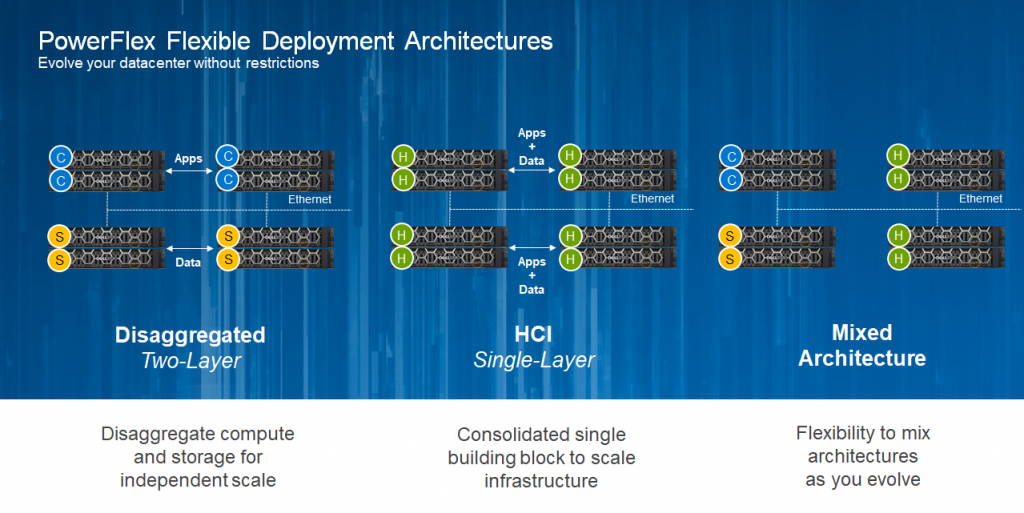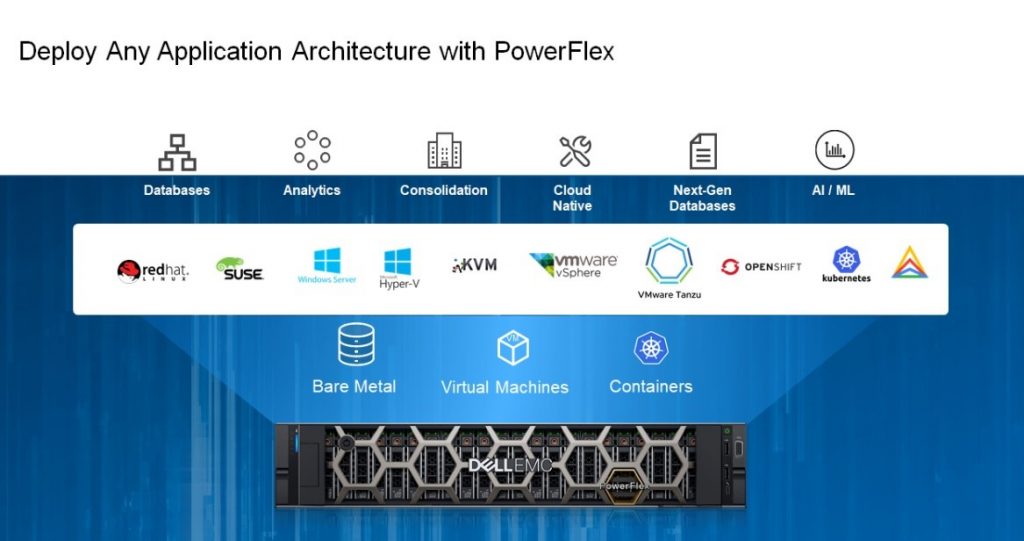Three years ago, Dell Technologies embarked on a journey to simplify our infrastructure portfolio, delivering significant innovation designed to help customers address current IT challenges while ensuring they’re prepared to tackle what lies ahead.
We have made incredible strides, building on our industry-leading PowerEdge server portfolio by introducing products like PowerSwitch in networking, PowerOne autonomous infrastructure and PowerProtect in the data protection space. On top of that, we have streamlined our storage portfolio, introducing PowerMax and PowerStore primary storage and PowerScale unstructured storage, joining PowerVault for entry-level customers. And of course, VxRail remains the premier HCI platform for VMware environments.
Today, we have officially fulfilled our portfolio simplification commitment with the introduction of Dell EMC PowerFlex software-defined storage (SDS).
In the data era, it’s more critical than ever for IT to adapt quickly to meet changing workload, scalability and performance requirements. The PowerFlex family, previously known as VxFlex, is now part of our Power portfolio, helping companies harness the potential of software and embrace change while delivering consistent, predictable IT outcomes that drive business forward.
Harnessing the Power of Software
PowerFlex delivers sophisticated high-performance, scalable, resilient storage services, and its unmatched flexibility allows customers to use it in dis-aggregated, bare metal or multi-hypervisor deployments. It unlocks massive performance with the ability to scale capacity, IO performance and throughput linearly to 1,000’s of nodes and achieve six-nines (99.9999%) availability.

PowerFlex easily handles demanding business-critical applications while delivering simple scalability for rapid service roll-out. With PowerFlex, customers can deliver application SLAs, scale services on-demand to meet business requirements and ensure uninterrupted seamless service delivery under any conditions. For customers, that means better business execution, increased revenue opportunities and more productive teams.
Thanks to PowerFlex’s software-defined architecture, disruptive and costly data migrations are a thing of the past. Nodes are easily swapped out with no downtime or performance/availability impact. This means no more fork-lift upgrades and brute-force data migrations. Customers can evolve their infrastructure as needed to meet key business objectives while freeing up IT organisations to focus on business-critical applications.
This release also brings a number of new data services that help our customers achieve predictable outcomes and greater availability. Notable new features include[i]:
- Replication and Disaster Recovery: Native asynchronous replication and fully operational disaster recovery with RPO as low as 30 seconds.
- Secure Snapshots: For industries with specific corporate governance and compliance requirements, including healthcare and finance.
“We are seeing more revenue opportunities because of how the applications are running on Dell EMC PowerFlex. We have more visibility into what we’re doing,” said a customer in the transportation industry. “As a result, we are seeing an increase in performance. People can do things quicker from a performance perspective because of the applications and that leads to more revenue. [ii]”
Exceptional Agility and Flexibility to Embrace Change
PowerFlex provides an agile, flexible foundation for IT infrastructure, enabling businesses to embrace change. It supports a wide variety of traditional and modern applications, ranging from bare-metal databases and virtualised workloads to modern cloud-native containerised applications, all on a single platform.

For those deployments that require non-VMware hypervisors or bare-metal OS support, PowerFlex allows customers to mix and match and scale with two-layer dis-aggregated infrastructure, suitable for data-intensive workloads or any deployment that requires the ability to scale compute and storage requirements separately. With PowerFlex, customers can evolve their applications and infrastructure as business needs change.
PowerFlex is available in appliance and rack consumption options. The appliance offers massive scale potential and flexible networking options. PowerFlex Rack is a fully engineered rack-scale system with integrated networking and professional support. It’s designed to simplify planning and deployment and ensure smooth operations from Day-0 through upgrades and system expansion.
Achieve Predictability and Consistency
PowerFlex empowers organisations to achieve consistent, predictable outcomes in the face of changing IT and business conditions.
The platform provides a robust framework for automating IT processes and workflows that help drive consistency across infrastructure. PowerFlex Manager provides a simple, comprehensive tool-set for IT operations and life-cycle management that updates PowerFlex and automates operational workflows for the entire infrastructure – from firmware and BIOS to nodes, networking and hypervisors – across storage and compute. PowerFlex Manager also offers open APIs that easily integrate PowerFlex with cloud automation and container management platforms, including Dell Technologies Cloud (DTC), driving further consistency across deployments and improved IT agility.
“PowerFlex supports the entire infrastructure our school needs in order to operate,” said David Lee, Director of IT Infrastructure and Development, Nexus International School. “The platform’s massive performance and availability allowed us to seamlessly transition to working from home and off-campus learning.”
PowerFlex is validated and optimised for a broad ecosystem of enterprise workloads and cloud automation platforms, enabling IT to confidently consolidate any workload. Across workload categories, PowerFlex has demonstrated consistently superior application performance and better operational outcomes, enabling reduced infrastructure footprint and simplified operations while delivering consistent application SLAs. The ecosystem includes enterprise databases like Oracle and SQL Server, enterprise applications like SAP HANA, analytics workloads like Splunk, SAS and Elastic Stack, and cloud automation platforms that include Red Hat OpenShift, VMware Cloud Foundation (VCF), Dell Technologies Cloud, Kubernetes, and Google Anthos.
|
Application Workload [iii] |
PowerFlex Performance Outcomes |
|
Oracle RAC
|
10 Million TPM with average latency of 1 millisecond with 8RU 1 Million IOPs with average latency of 1 millisecond with 6RU |
|
Microsoft SQL Server |
8.4 Million TPM with average latency of 1 millisecond with 8RU |
|
Elastic Stack |
1 Billion indexing events in 3 hours with 7RU |
|
Cassandra DB with Kubernetes |
300,000 operations/sec with 8RU |
Don’t Fear Change, Embrace It
Learn more about how PowerFlex’s extreme agility, performance and scalability can help you embrace change by visiting DellTechnologies.com/PowerFlex.
# # #
Additional PowerFlex Resources:
- Oracle Application Workload Whitepaper
- Microsoft SQL Server Whitepaper
- Elastic Stack Whitepaper
- Cassandra DB with Kubernetes Whitepaper
[i] PowerFlex 3.5 available now for storage and two-layer deployments. HCI available later this summer.
[ii] IDC Business Value Snapshot, sponsored by Dell, Dell EMC PowerFlex Whitepaper, June 2020
[iii] Based on Dell testing. Results may vary based on configurations.
